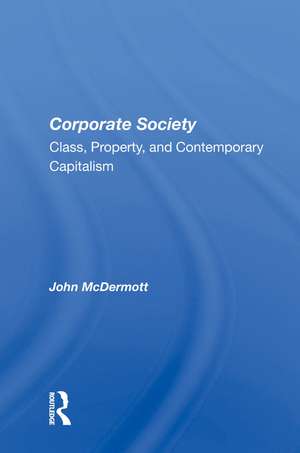Corporate Society: "Class, Property, and Contemporary Capitalism"
Autor John McDermotten Limba Engleză Hardback – 7 iun 2019
| Toate formatele și edițiile | Preț | Express |
|---|---|---|
| Paperback (1) | 264.86 lei 6-8 săpt. | |
| Taylor & Francis – 7 dec 2020 | 264.86 lei 6-8 săpt. | |
| Hardback (1) | 766.31 lei 6-8 săpt. | |
| Taylor & Francis – 7 iun 2019 | 766.31 lei 6-8 săpt. |
Preț: 766.31 lei
Preț vechi: 1104.02 lei
-31% Nou
Puncte Express: 1149
Preț estimativ în valută:
146.68€ • 159.38$ • 123.29£
146.68€ • 159.38$ • 123.29£
Carte tipărită la comandă
Livrare economică 21 aprilie-05 mai
Preluare comenzi: 021 569.72.76
Specificații
ISBN-13: 9780367007065
ISBN-10: 0367007061
Pagini: 224
Dimensiuni: 152 x 229 mm
Greutate: 0.57 kg
Ediția:1
Editura: Taylor & Francis
Colecția Routledge
Locul publicării:Oxford, United Kingdom
ISBN-10: 0367007061
Pagini: 224
Dimensiuni: 152 x 229 mm
Greutate: 0.57 kg
Ediția:1
Editura: Taylor & Francis
Colecția Routledge
Locul publicării:Oxford, United Kingdom
Cuprins
Preface -- Introduction: Renewing the Discussion -- Corporate Form: Organizing the Production of a New Physical World -- The Evolution of Corporate Form -- Private and Corporate Property -- The Ruling Class in Corporate Society -- The Modern Middle Class -- Managing the Collective Worker -- Neither Artisans nor Proletarians -- Epilogue: Alberich and Prometheus— the Modern Corporation as a Social Institution
Descriere
The modem corporation, praised and condemned by thinkers from Weber to Bell and Dahrendorf, is the institution of modern society. Its enormous success has made it our premier social, as well as economic, institution, and modern society is increasingly coming to reflect the social structure, values, priorities, and hierarchies that have evolved within the corporation. So argues John McDermott in Corporate Society, an original and far-reaching analysis of the impact of the modern corporation on contemporary social structure. Combining business history with political insight, McDermott offers a systematic critique of the post-industrial order and the illusions it fosters. He warns against the development of a "post-society industry" in which the corporate order replaces democratic institutions as the primary organizer of social and cultural life, and he argues that the corporation harbors a set of explosive socioeconomic contradictions. The need to confront the challenges of this new order, with its potential for a uniquely modern class conflict, makes Corporate Society a crucial work for teachers and students alike.
